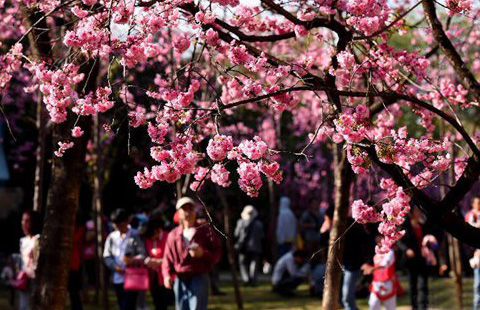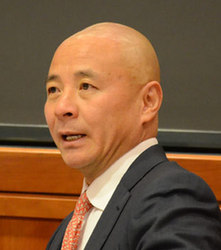Why tech IPOs still pick NYC over HK
Updated: 2015-03-03 12:08
By Niu Yue in Cambridge, Massachusetts(China Daily USA)
|
|||||||||
Chinese technology companies will continue to prefer New York to Hong Kong as the venue for initial public offerings, and one of the key reasons is that the Hong Kong Stock Exchange does not recognize different stock-voting structures, which are used by many technology companies to keep their unique cultures, according to lawyers involved in Alibaba's historic IPO.
"When you have a very innovative company with great ideas, they start to raise funds," said Leiming Chen, partner of Simpson Thacher & Bartlett LLP, an international law firm based in New York that has offices in Beijing and Hong Kong. "Their share holdings will be diluted to a very minority percentage. How are you going to deal with control, culture, innovative mindset that has been driving the company [to be] so successful?"
|
|
|
Leiming Chen, Partner of Simpson Thacher & Bartlett LLP |
"[That] the founder and management have the control of the enterprise is very important," Chen said at the Asia Business Conference of Harvard University on March 1.
To maintain the company's original vision and value, and make sure long-term goals will not be overrun by short-term financial benefits sought by some investors, tech companies often use voting structures other than the traditional "one share, one vote" system.
Many technology companies, including Google and Facebook, use a dual-class share system, in which some shareholders, often founders, can have more voting rights with fewer shares.
That system is not permitted on the Hong Kong Stock Exchange, which requires all shares to have equal voting rights. Stock exchanges on the Chinese mainland do not accept that voting system, either. Meanwhile, the Nasdaq Stock Market and the New York Stock Exchange accept different share structures, as long as the companies disclose them.
"When a company is looking to decide whether to list in Hong Kong or the US, it looks at its peer companies and looking to see what structure they have," said Sarah Payne, partner of Sullivan & Cromwell, also a New York firm, which was an adviser to Alibaba's IPO.
"You are not able to get a similar structure which does preserve your fundamental core values if you are listing in Hong Kong," she said. "When we are looking at which companies are listing here, it tends to be more on the tech side."
The issue was brought to public attention when Alibaba Group Holding Ltd decided not to have its IPO in Hong Kong at a time when it was trying to reach a global market. Alibaba has a partnership structure that gives equal voting rights to all shareholders but nomination rights to some 20 partners.
The Hong Kong exchange was reported to have considered changing its regulations to accept more shareholding systems, but did not.
Moreover, New York markets give tech companies better valuations due to a higher concentration of expertise, said William Hay, general counsel of Baring Private Equity Asia. "It is a de-institutional market," he said. "It is really a global market, and Hong Kong is becoming a global market, but still more of the trade is very local."
The reason why Hong Kong denies different voting structures may be that most Hong Kong-listed companies are family businesses, and the Hong Kong stock exchange is worried that family members will take other investors' money without any trouble, said Hay.
"There is different history and different traditions," he said.
During Chen's keynote speech at the conference, he also offered his opinion on the potential class-action lawsuits by five US law firms, alleging Alibaba made inadequate disclosure or false statements about counterfeit products sold on its online platforms.
"Clearly, you all know, in the United States there is a litigation culture; people litigate over anything," Chen said.
"Whenever there is a stock volatility associated with the news coming out from the company, the first thing they call their lawyers to do is to go to the IPO prospectus and SEC filings."
Lu Huiquan in New York contributed to this story.

 Caveman saves money for family
Caveman saves money for family
 China's interest rate adjustments beteen 2008 and 2015
China's interest rate adjustments beteen 2008 and 2015
 Buddhist monks break bricks in kung fu
Buddhist monks break bricks in kung fu
 Beijing steps up security for two sessions
Beijing steps up security for two sessions
 Han-style Chinese beauties at Cambridge
Han-style Chinese beauties at Cambridge
 Prince William visits Forbidden City
Prince William visits Forbidden City
 Aerial views of plum blossoms as beautiful as oil paintings
Aerial views of plum blossoms as beautiful as oil paintings
 Visitors enjoy cherry blossom in a park in SW China's Yunnan
Visitors enjoy cherry blossom in a park in SW China's Yunnan
Most Viewed
Editor's Picks

|

|

|

|

|

|
Today's Top News
China passes US at movie box office
Air pollution tops public concerns for two sessions
Wanda's Wang tops China's rich list
US businesses to lower 2015 reinvestments in China
Hilary Clinton may have broken federal laws - reports
US policy focused on Asia: official
China more proactive at UN
Cooperation potential called 'limitless'
US Weekly

|

|









